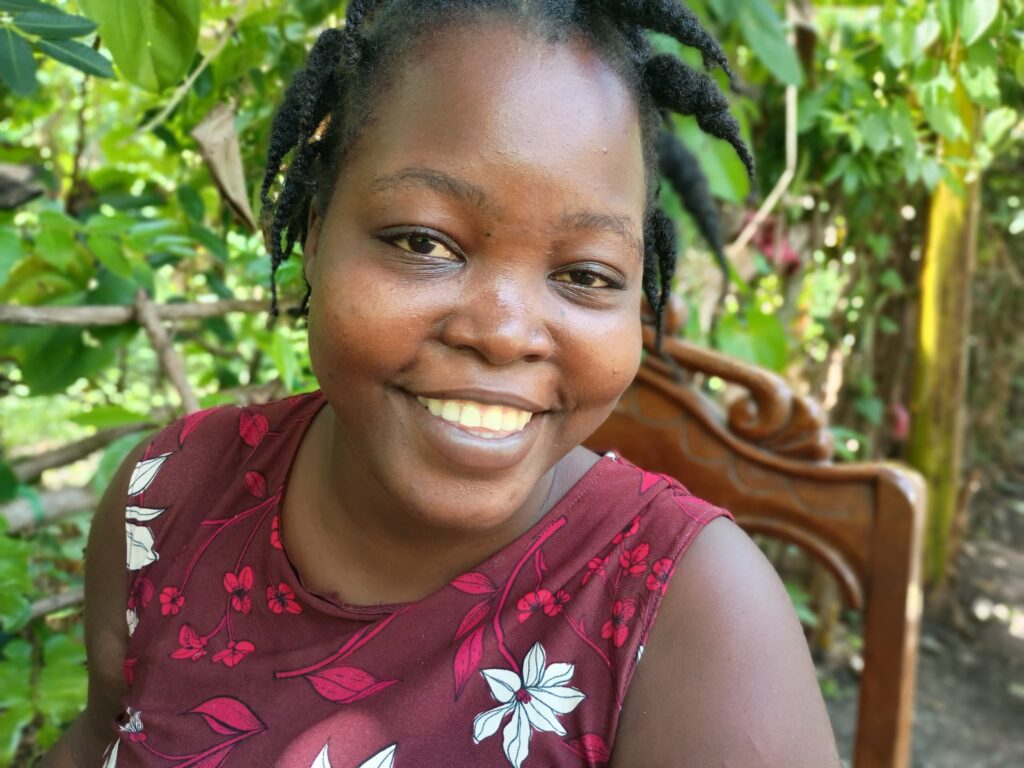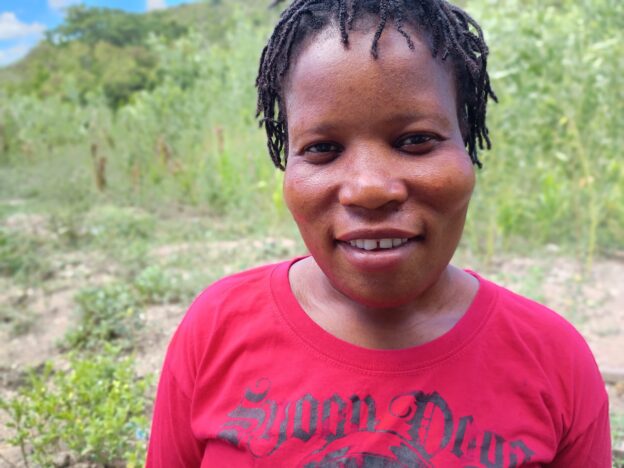Guerdline Jean is what the CLM team calls a “special case.” In the language of CLM, that means that our team did not initially find her by going through the lists of community members living in poverty that we typically compile at a neighborhood meeting. She did not appear on any list. She was not mentioned at the community meeting because she wasn’t really part of the community. But while our staff was in the neighborhood, looking for everyone on the list, they came across her. At the time, she, her partner Anténor, and their first child were staying with Anténor’s younger sister. Chatting with Guerdline, our team heard her story, and they added her to our list.
At the time, she and Anténor had nothing of their own. They had no livestock, no land. When they weren’t staying with his sister, they were living in a rented room. Guerdline would buy food on credit to make their meals, and she’d pay what she owed when Anténor occasionally got construction work or work in someone’s field. They could not depend on having food to eat every day.
When she’s asked what has changed since she joined the program, she is quick to respond. “Everything.”
The cash stipend helped her take a small, first step. “I got 500 gourds every week, so I did not need to buy on credit so often.”
She used the first payment of the investment funds that the program set aside for her to buy two goats. One had two bucks, and the other had a doe. She has five, and the two older females are pregnant again. She plans to let the two bucks get bigger until she can sell them and buy two additional females in their place. And she has a plan for all those goats. “When I have enough, I will sell some to buy a cow or to make improvements to my house.”
She had wanted to use the second payment of her investment fund to start a small commerce, but she was pregnant at the time, and she couldn’t hike around with her wares. She did not see herself as someone who would be able to sell from her home. “If you sell out of your home, neighbors are always asking to buy on credit. Then they don’t pay.” So, she used the money instead to buy a sheep and a couple of chickens. The chickens died, but the sheep had its first lamb, and it’s pregnant again.
Most interestingly, Guerdline also has a pig, which she purchased since she joined the program. She explains that she purchased the pig out of money she saved over time from Anténor’s earnings. So, an obvious question presents itself: Why couldn’t she buy something like that pig before she joined the program? CLM has had nothing to do with what Anténor earns. Guerdline’s answer is clear and telling: “I never knew how to do it.” She explains her answer. “The advice I get helps me see what I can do.”
The couple also bought a house near Guerdline’s parents. “Anténor wanted to move away from his family.” The house and the land it’s on will cost 150,000 gourds, or just over $1,100. But the seller was willing to wait as Anténor sells the land he has in his family’s neighborhood. He’ll then use that money to pay for their new place.
The new house is outside of the area where the CLM team is working right now, but it is close enough that the team can still arrange regular home visits. Guedline takes a motorcycle taxi back to her old neighborhood once a week so she can participate in her VSLA. The ride costs her 150 gourds, but it is worth it. “It gives you a way to save money.” She walks home, but she pays for a taxi to get there to avoid the penalty her group assigns to late arrivals.
Because she and Anténor already owned a home, they did not need to buy home repair materials. Guerdline is not ready to go back into small commerce, and she plans to use her construction money to do so. Her child is now old enough that her mother can babysit when Guerdline goes out, and the older women is happy to do so. Guerdline is planning to buy the sorts of household goods – curtains and bedlinen – that Haitian families like to buy in the last months of the year to prepare for the New Year’s celebration.

Widlande Ruphen lives along the rocky stream that runs through the middle of Grankwa. She and her partner, Orvens, live in a small how with their two young children. Widlande’s younger sister sometimes stays with them as well.
Widlande has been struggling to walk since 2018, and she isn’t sure why. She can hobble along, but she’s unsteady on her feet. It isn’t pain. It’s weakness. She has trouble with her balance. It has kept her close to home for all that time, so the pressure has fallen onto Orvens to be the family’s sole earner. He’s a hardworking farmer, but the couple does not have their own land. He farms as a sharecropper, giving half of every harvest to the land’s owners.
They were living in a rented room and, as Widlande says, they would eat when they had food. They had no livestock, and Widlande had no business of her own at all.
Widlande joined CLM, and she asked the team to buy her goats. She was able to get three with the money available. One of the three died, but she was able to replace it. The three goats are yet to reproduce, but Widlande remains hopeful. At the end of her VSLA’s 12-month cycle, she was able to use her pay-out to buy a pig and a couple of chickens. So, she is starting to accumulate a small measure of wealth.
She has also started a small commerce. She began by purchasing fish from merchants, who bring it to Gwomòn from Gonayiv. But it has to sell fast to stay fresh, and she found it didn’t always sell well. And since she can’t get around, she was restricted to selling in her own neighborhood, where people are already inclined to want to buy on credit. And it was hard to say both because they were her neighbors and because the fish could go bad.
So, she switched businesses. She began buying cookies and crackers. She also makes and sells gingerbread made with the local molasses. She sells them by the side of the road, across the stream from her home. Her profits are minimal, but they are extremely dependable. When I suggested that such a small business might not even be worth her time, she blanched. “I know I always have something, even if it is only a hundred gourds.
And she has a secondary business that has been helping a lot. She and Olvens bought the small plot they built their new home on. They made only a downpayment, but the landowner has been willing to let them take over the land while they pay off the balance they owe. And in the back of the plot, they found a treasure. The trees there are a good source of djondjon, a mushroom prized by Haitian cooks. Widlande can collect 2,500 gourds or more of it every week, at least during rainy season.
Between that extra income and her good management, Widlande has been able to accomplish a lot. The CLM program gave her 14 sheets of roofing, but she bought eight more by herself to complete the roof of her new home. Then she bought 23 more sheets to enclose her house. She explains why she chose to enclose her home with roofing, rather than stones or wood, which are more common choices. “It’s faster.” And she smiles as she speaks of buying the 31 sheets of roofing one at a time, as she was able to set aside the 750 gourds each of them cost.
Now Widlande is looking ahead. She is hoping that the goats will begin to reproduce. Having some that she can sell can help her achieve other things she would like to do. She wants to own a cow, and she wants money to invest to improve the home that she and Olvens have built. Beyond that, her focus is simple. “I want to send my children to school until they graduate.”
